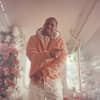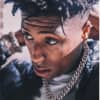Over the past two years, Kasseem Dean, the 33-year-old Bronx native bka Swizz Beatz, has only seen his resume get weirder and weirder. A Grammy award-winning producer/rapper whose first beat was DMX’s "Ruff Ryders' Anthem," Dean has transitioned, with increased fervor after marrying Alicia Keys in 2010, into an inexhaustible music industry do-it-all. From 2010-11, he served as "producer-in-residence" at NYU's Tisch School of the Arts, then, this January, just weeks before it was shut down by the US government, Dean was rumored to be the CEO of the massive file sharing site Megaupload. In yet another about-face, two weeks ago, he appeared at a news conference in Seoul announcing a partnership with South Korean television conglomerate ON-Media, promising to guide international collaborations between Korean and American pop artists. Like his alleged role in Megaupload, the Korean deal is as wickedly opportunistic as it is unexpected. And only amplifying the basic baffling nature of his career lately, Dean seems to surround himself with a perpetual vagueness about what's really going on. In this phone interview, he speaks interestingly on teaching, K-pop and the global monoculture, the Ruff Ryders reunion tour and (not so much) on his rumored role as CEO of Megaupload. Somehow, by the end, we're only left with more questions.
So explain the K-pop situation. The deal with ON-Media is an amazing creative deal, starting with a music component, TV component, touring component, a production component, a label component. My role is basically to migrate the cultures. My goal is to have music speak as the international language it is. I’m not the first person to tap on K-pop. There’s other artists out there like Will.I.Am and Kanye that have collaborated with K-pop artists. But this isn’t just a collaboration. I’m not trying to just do a feature. I’m really trying to migrate culture. I don’t have to produce everything, I don’t have to rap on everything. I want to set up tour and TV shows and just have a super creative outlet for people to express themselves. We need to start bridging those gaps, and thinking globally is the way to go. The world is global. It feels like Korea is in your backyard, the way the internet makes things. I just want to be the tunnel for that. I want to be the tunnel for music, art and fashion on a global level, and I want to start in Korea with K-pop. They still have artist development out there. Their artists really go through training and professional classes before they become stars. We’re missing that on our side.
So you think there's a professional missing in the American music industry? I think that’s one of the things we can learn. It’s not necessarily the artists’ fault [in the US]. Labels used to have money for artist development, but now they’re looking for access all ready to go. Artists feel seasoned off of YouTube views or whatever. But you know, it’s certain rules on how to be a star, certain things you have to be educated on. The whole lifestyle is overwhelming, and if artists don’t know how to handle it and it’s too much, by the time they figure it out it’s too late. It becomes a factory: one artist goes out, another comes in. Nowadays the biggest song in the world, you won’t remember it by the summer. I think there’s certain elements that are missing that cause people to lose respect for musicians and music, and I think educating people on the global side will bring in new answers and cool opportunities to do things better.
Did teaching at NYU influence your thinking? It let me know that this world is full of creative people way more than you’d think. But there’s not enough chances for those creative people to express themselves. You have all this talent bottled up, but there’s no outlets. You have to give up everything to a major. That works for some people, but it don’t work for most, and people know that now. So I go, wait a minute, there are other outlets around the world. Why should we be subject to this? And that put me on my global mission. And with traveling, what I find interesting is how alike things are. The way the city is, the way the clubs are, the way the restaurants are, the way the malls are. It’s all the same stuff. It’s like, man, this is all alike. We’re trying to get the same thing going. It’s a lot of miles away, but people don’t have no idea how close we are. It’s fundamental.
Can you talk about any specific plans? Just setting up cool ways of presenting the universal language. Bridging the gaps with collaborations can be the start of a global phenomenon. We’ve got this group called Big Bang, they dropped a song called “Blue," and I’m like, everybody should know about that. That shouldn’t only be K-pop news, it should be everybody news. So how do you keep communication going? When you’re a big artist in the states, they roll out the red carpets for you, and I don’t feel that love for artists from other countries when they come here. I’m like, wait a minute, that’s not fair. Why can’t they get some respect? So my thing is to team up a Big Bang with a Chris Brown, somebody like that. Team up 2NE1 with Nicki Minaj or Rihanna. You take an international hit and make it even more international, even more familiar. Bridge that gap. Communication gets spoken on both sides. This side is getting familiar, that side is getting familiar, and the synergy lets new creative things happen outside of the usual boundaries. It helps people become more open minded, and that’s what art and music should be. The freedom to fly and go anywhere you want to go.
And this is also, presumably, a very lucrative business deal. I don’t really base things I do on money, I base them on making history. I think our business is driven by money, which affects a lot of artists in a creative way. Once an artist really taps into their creative sense and they have business sense, everything will fall in line.
While you're looking forward, you're also looking back a bit with this Ruff Ryders reunion tour. First and foremost, it's great to start off with such an amazing brand as Ruff Ryders that people see as authentic. When we came out, we changed the culture of music at that time. It was just something about the timing of that that made sense to the people. And so to come back years later and have people missing that in their life, to perform with DMX at SOBs and it be sold out, people knowing every word of his songs, it’s just like, wow, we really built something. Ruff Ryders was a great starting point, and to tour with it again is a cool thing.
Lastly, can you clarify your role in Megaupload? It’ll be a time and place for that. In due time everybody will understand everything. But right now, I put the zippers on.



